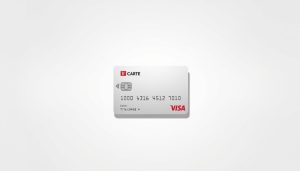In today’s fast-paced world, managing your finances effectively is more important than ever. One essential tool in your financial arsenal is a credit card, which provides convenience, security, and potentially rewarding benefits. If you’re ready to “get your credit card” and take control of your financial journey, you’re in the right place.
Navigating the world of credit cards can seem daunting with so many options available, each offering different perks, interest rates, and terms. Whether you’re a first-time cardholder or looking to upgrade, understanding what to look for can make all the difference. We’ll help you explore these options and find the perfect card that fits your lifestyle.
With our comprehensive guide, you can learn how to effectively “get your credit card” while maximizing its advantages. From building a positive credit history to earning cashback rewards, we’ll cover everything you need to know. Start your journey to financial empowerment today by choosing the right credit card for you.
Understanding Credit Card Basics
Before you get your credit card, it’s crucial to understand the basics. A credit card offers you a line of credit that you can use for purchases, with the agreement that you will pay back the borrowed amount over time. This payment includes interest, which can vary significantly between cards, so it’s important to consider the Annual Percentage Rate (APR) when choosing a card.
Credit cards come with various features such as reward points, cashback offers, and travel benefits. While these can be appealing, it’s essential to assess your spending habits and choose a card that aligns with your financial goals. Additionally, some credit cards come with annual fees, so consider whether the benefits outweigh the costs.
Moreover, credit card issuers will require certain criteria to be met before approving your application. These typically include a credit history check and an assessment of your income. Having a good understanding of these requirements can improve your chances of getting approved quickly and efficiently.
Choosing the Right Credit Card
Choosing the right credit card involves evaluating several factors to match your personal needs. Start by assessing the primary purpose of your credit card. Are you seeking to build credit, earn rewards, or enjoy travel perks? Identifying your objective will narrow down your choices and help you focus on cards that offer benefits tailored to your needs.
Interest rates and fees are crucial aspects to consider. If you tend to carry a balance month-to-month, low-interest cards may be more beneficial. Conversely, if you plan to pay off your balance each month, you might prefer cards that offer rewards, even if they come with higher interest rates. Don’t forget to review any additional fees such as annual fees, foreign transaction fees, and late payment penalties.
Lastly, consider the issuer’s reputation for customer service and support. Access to a reliable customer service team can make dealing with potential issues or inquiries much smoother. Reading reviews and seeking recommendations can provide insight into other customers’ experiences and help guide your decision.
Applying for Your Credit Card
Once you’ve chosen the ideal credit card, the application process is straightforward. Most issuers offer online applications, which are quick and convenient. You will need to provide personal information such as your name, address, and social security number, along with details about your employment and income.
After submitting your application, the issuer will review your credit history and financial information to determine your creditworthiness. This process typically takes a few days, although some applications may be approved instantly. During this time, the issuer will check your debt-to-income ratio and credit score to decide on your credit limit and interest rate.
Upon approval, your new credit card should arrive within a few weeks. Make sure to carefully read through the terms and conditions that arrive with your card. Knowing the due dates, fee structures, and penalties for late payments will help you manage your card effectively from the start.
Maximizing Credit Card Benefits
To truly benefit from your credit card, focus on maximizing the rewards and advantages it offers. Many cards provide cashback on everyday purchases, such as groceries or gas, while others offer airline miles or hotel points that can be redeemed for travel-related expenses. To make the most of these benefits, align your spending habits with the reward categories.
Additionally, be vigilant about promotional offers like introductory 0% interest rates on balance transfers or new purchases. While these offers can provide significant savings, it’s important to note the terms, such as when the promotional period ends, to avoid unexpectedly high interest rates later.
Furthermore, managing your payment habits is essential. Paying your balance in full each month will ensure that you avoid interest charges and late fees. Consistently making timely payments will also enhance your credit score, opening up opportunities for more favorable loans or credit offers in the future.
💡 How to Apply for Your Credit Card in Minutes
Building a Positive Credit History
Once you get your credit card, it’s a powerful tool for building a positive credit history, which is invaluable for your financial future. A good credit history can influence your ability to secure loans with favorable terms, rent a home, or even obtain some jobs. To build this history, make regular, on-time payments and keep your credit utilization low.
Another strategy is to keep old accounts open. Closing a credit card, especially one with a positive payment history, can negatively impact your credit score. Therefore, even if you don’t use a particular card frequently, keeping it active can benefit your credit profile as long as there are no significant fees associated with the account.
Lastly, regularly monitor your credit report to ensure accuracy and identify any potential fraud. Most financial institutions offer free credit score access, and you are entitled to a free report annually from each of the three major credit bureaus. Reviewing these reports helps maintain a healthy credit score by addressing discrepancies promptly.
Conclusion
In conclusion, making the decision to get your credit card can open doors to numerous financial advantages, but it requires careful consideration and responsible management. By understanding basic credit card terms, choosing the right card, and making informed decisions during the application process, you can tailor your credit card benefits to suit your financial needs and objectives.
Furthermore, maximizing these benefits through strategic use and timely payments can enhance your credit score and financial stability. With diligence and informed choices, your credit card can become a pivotal tool in achieving financial empowerment and successfully navigating your financial journey.


